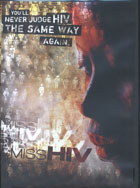
Miss HIV 2007
Distributed by The Video Project, PO Box 411376, San Francisco, CA 94141-1376; 800-475-2638
Produced by Mart Green
Directed by Jim Hanon
DVD, color, 88 min.
Sr. High - Adult
African Studies, Health Sciences, Ethics, Gender Studies, Women’s Studies, Anthropology, Sociology
Date Entered: 06/13/2011
Reviewed by Barb Bergman, Minnesota State University, MankatoIn spite of an estimated 24% of the Botswana population being infected, those with HIV/AIDS remain largely stigmatized. The mysterious origins of HIV where symptoms might not appear for 10 years have “shrouded the disease in fear, superstitious, and stigma beyond the experience of any Western culture.” An unwillingness to talk about the issue even amongst family members presents a major obstacle in both the prevention and treatment of HIV/AIDS. As is pointed out in the introduction, many Africans who could benefit from antiretrovirals (ARV) do not take advantage of the readily available drugs because it would mean that other people would then know of their HIV-positive status.
Miss HIV covers a wide range of issues relating to HIV/AIDS in sub-Saharan Africa. The film highlights different ideologies for prevention of HIV/AIDS infection, using Botswana and Uganda as examples. Uganda’s message has largely focused on encouraging abstinence. Opponents point out that such policies such are moralistic and paternalistic, expecting changed behavior from men while not helping women to control their sexual lives.
The titular Miss HIV stigma-free pageant is actually a small portion of the film, but gets to the heart of the issue, which is that of the need to empower women. The pageant is presented as a step forward in a Botswanan culture that still prefers to not talk about the problem of HIV/AIDS.
The film quality of Miss HIV is excellent. It is visually beautiful, clear with a nice artistic flare. Graphical subtitling accompanies much of the dialogue, helping to highlight the points being made as well as helping viewers understand the African English accents.
Highly recommended for all classes discussing public health policies as well as those studying HIV/AIDS issues.